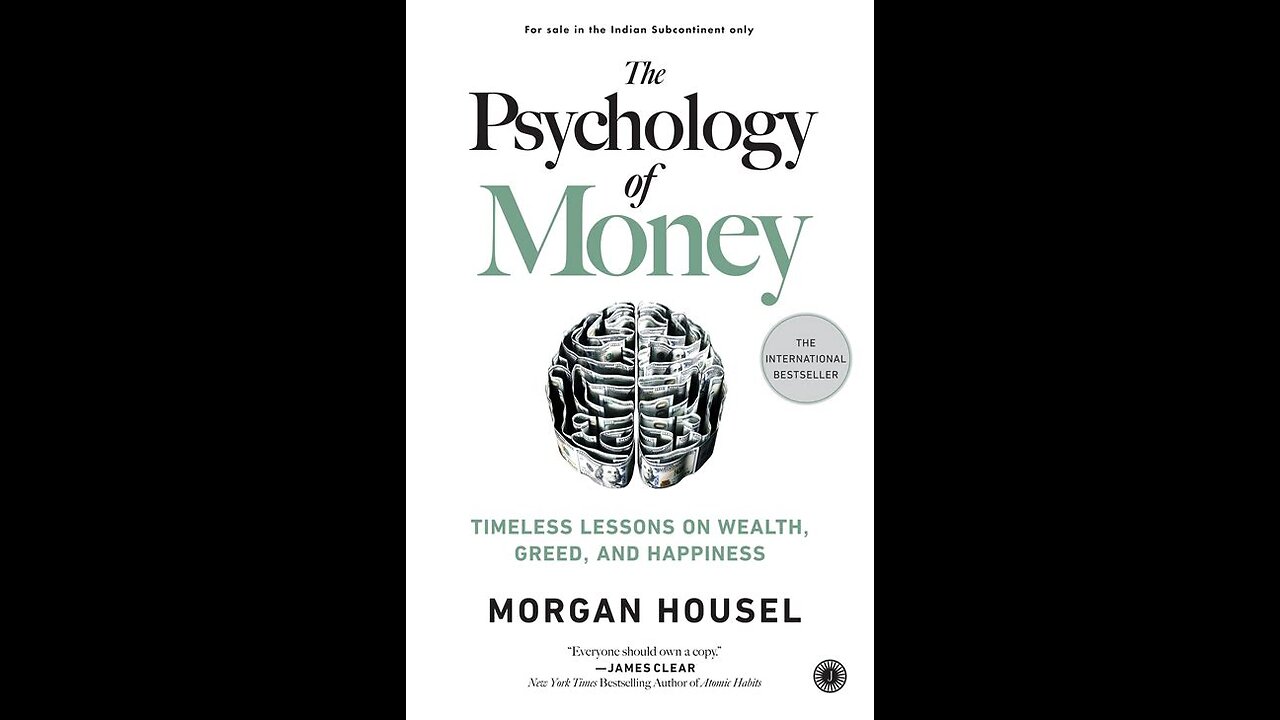Premium Only Content

The Psychology of Money by Morgan Housel | Summary
Buy Here: https://amzn.to/4a2Z5Yp
"""The Psychology of Money"" by Morgan Housel is a thought-provoking exploration of the psychological and behavioral aspects that influence our relationship with money. In this book, Housel dives into the complexities of personal finance, shedding light on the often-overlooked factors that shape our financial decisions and outcomes.
Housel argues that when it comes to managing money, behavior matters more than numbers. He suggests that financial success is not solely dependent on investment strategies or market knowledge, but rather on how we navigate our emotions and make decisions about money.
One of the key themes in the book is the role of luck. Housel emphasizes that luck plays a significant part in our financial journeys, and its influence is often underestimated or ignored. By acknowledging the role of luck, we can cultivate humility and gain a more realistic perspective on our own financial achievements or setbacks.
Another fundamental concept explored in the book is the power of compounding. Housel illustrates how small, consistent actions over time can have a profound impact on our financial well-being. He emphasizes the importance of long-term thinking and patience, highlighting the exponential growth potential that comes with compounding.
Risk is also a central topic in ""The Psychology of Money."" Housel delves into the different facets of risk and its influence on financial decisions. By understanding and managing risk effectively, individuals can strive for financial stability and avoid costly mistakes.
The book further examines the behavioral biases that can hinder sound financial decision-making. Housel illustrates how biases such as overconfidence, loss aversion, and herd mentality can lead to poor investment choices. By recognizing and mitigating these biases, individuals can make more rational and informed financial decisions.
""The Psychology of Money"" also prompts readers to question their definition of financial ""enough."" Housel challenges the traditional notion of wealth accumulation as the ultimate goal and instead encourages readers to define their own version of enough. By shifting focus from the pursuit of endless riches to finding contentment and satisfaction in the financial journey, individuals can attain a healthier and more balanced perspective on money.
Throughout the book, Housel uses real-life examples, anecdotes, and research to illustrate his points effectively. He writes in a clear and engaging manner, making complex financial concepts accessible to readers from all backgrounds.
It is worth noting that while ""The Psychology of Money"" offers valuable insights into the behavioral aspects of personal finance, it may not provide extensive practical guidance on specific financial strategies or investment advice. Readers seeking detailed step-by-step instructions or specific recommendations may need to supplement this book with other resources tailored to their individual needs.
In conclusion, ""The Psychology of Money"" is a compelling and enlightening read that uncovers the often-overlooked psychological factors that impact our financial decisions. By understanding the behavioral aspects of money management, readers can develop a more mindful and intentional approach to their finances. This book serves as a valuable guide to navigating the complex interplay between psychology and personal finance, ultimately empowering individuals to make better financial choices and achieve long-term financial well-being."
-
 LIVE
LIVE
Dr Disrespect
9 hours ago🔴LIVE - DR DISRESPECT - TARKOV ALL DAY
1,868 watching -
 LIVE
LIVE
Page Six
6 hours agoMet Gala 2025 red carpet arrivals | Watch live
323 watching -
 1:09:10
1:09:10
The Daily Signal
1 hour ago🚨 LIVE: Democrats Melt as Their Media Burns Down
8.41K1 -
 LIVE
LIVE
LIVE WITH CHRIS'WORLD
11 hours agoLIVE WITH CHRIS’WORLD - Trump is ALWAYS 10 Moves Ahead!
92 watching -
 40:41
40:41
Donald Trump Jr.
6 hours agoTCB at the FTC, Interview with Commissioner Andrew Ferguson | TRIGGERED Ep.239
94.2K30 -
 59:51
59:51
BonginoReport
5 hours agoPresident Trump Triggers The Libs with Jokes and Memes - (Ep. 41) - Nightly Scroll with Hayley
47.9K48 -
 1:17:50
1:17:50
Kim Iversen
4 hours agoIsrael First: Congress Almost Criminalized Free Speech Today | Why the West Wants This African Leader DEAD
78.5K80 -
 55:21
55:21
LFA TV
1 day agoLast Hour Urgency | TRUMPET DAILY 5.5.25 7PM
17K1 -
 1:05:59
1:05:59
2 MIKES LIVE
10 hours ago2 MIKES LIVE #212 Deep Dive Monday!
13.6K1 -
 1:28:26
1:28:26
vivafrei
7 hours agoTrump to PAY Illegals to LEAVE? Bill to Ban Boycott PULLED? "Terror" Attack Foiled in UK & MORE!
109K40